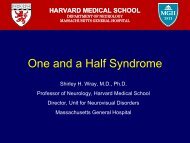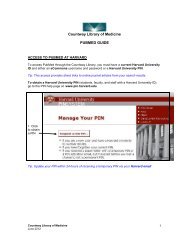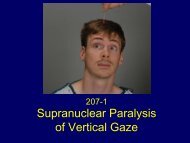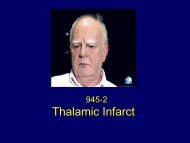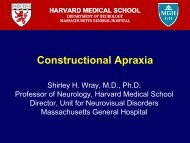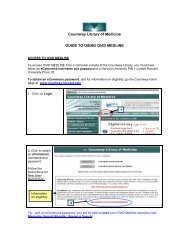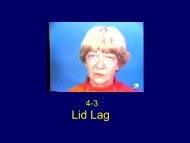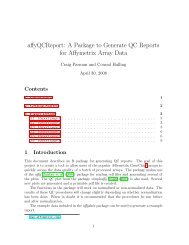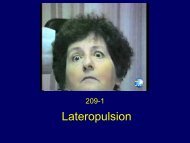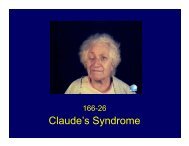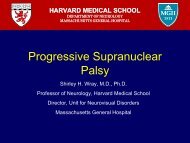Alexia without Agraphia
Alexia without Agraphia
Alexia without Agraphia
You also want an ePaper? Increase the reach of your titles
YUMPU automatically turns print PDFs into web optimized ePapers that Google loves.
942-5<br />
<strong>Alexia</strong> <strong>without</strong> <strong>Agraphia</strong>
Neurovisual Exam<br />
Visual acuity 20/60 or better OU (made<br />
error reading Snellen chart)<br />
Fields: Dense right homonymous<br />
hemianopia<br />
Pupils: equal, normal reflexes<br />
Full eye movements<br />
Normal discs and fundi OU
Visual Fields<br />
Figure 1. Automated perimetry showing dense right homonymous hemianopia
Color Vision<br />
Ishihara pseudo-isochromatic test of color<br />
vision performed <strong>without</strong> error<br />
Read single and two digit numbers by<br />
tracing them out correctly with his finger<br />
Unable to name color correctly (color<br />
anomia)<br />
Named red and blue bottle caps correctly<br />
Named green, purple and yellow, orange<br />
Matched two red objects correctly
Visual Tests<br />
Correctly identified 2 out of 3 famous faces<br />
No visual disorientation - simultanagnosia
Neurological Exam<br />
Slight right facial weakness<br />
A mild right hemiparesis with right pronator<br />
drift<br />
Mild hyperreflexia on the right with an<br />
extensor plantar<br />
No sensory extinction, apraxia,<br />
astereognosis, or agraphesthesia
Stroke Presentation<br />
<strong>Alexia</strong> with agraphia<br />
A dense right homonymous hemianopia<br />
Color anomia
Neuroimaging<br />
A repeat MRI with DWI showed a new left<br />
occipital lobe infarct in the distribution of<br />
the left P2 division of the posterior cerebral<br />
artery (PCA).
Neuroimaging<br />
Series of axial<br />
FLAIR scans<br />
shows a<br />
posterior<br />
cerebral artery<br />
infarct involving<br />
the occipital lobe<br />
and splenium of<br />
the corpus<br />
callosum
Neuroimaging
Neuroimaging
Neuroimaging
Neuroimaging
Disconnection Syndrome<br />
Figure 2. Connections involved in<br />
naming a seen object and in<br />
reading. The visual pattern is<br />
transferred from the visual cortex<br />
and association areas to the<br />
angular gyrus, which arouses the<br />
auditory pattern in the Wernicke<br />
area. The auditory pattern is<br />
transmitted to the Broca’s areas,<br />
where the articulatory form is<br />
aroused and transferred to the<br />
contiguous face area of the motor<br />
cortex.<br />
With destruction of the left visual<br />
cortex and splenium (or intervening<br />
white matter), words perceived in<br />
the right visual cortex cannot cross<br />
over to the language areas and the<br />
patient cannot read.
Criteria for Diagnosis of Pure<br />
<strong>Alexia</strong><br />
Severe disturbance of reading<br />
comprehension<br />
Linguistically correct writing spontaneously<br />
and to dictation<br />
Normal oral spelling<br />
Absence of aphasia and dementia
Damasio’s Criteria for Color<br />
Anomia<br />
Damage to the left lingual gyrus<br />
Damage to the left hippocampal region<br />
(hippocampus plus parahippocampal<br />
region)<br />
Presence of right hemianopia
Reading<br />
Psychologists have noticed that pure<br />
alexics often read slowly, pronouncing or<br />
naming each letter aloud, resulting in an<br />
increase in reading time for words as a<br />
function of their length<br />
This has been termed “letter-by-letter<br />
reading” and the question it raises is: How<br />
is letter and word information transmitted<br />
across different parts of the callosum from<br />
right to left
Reading<br />
The basic idea has been that letter<br />
identities are transmitted in parallel<br />
through the splenium and in less efficient,<br />
possibly serial ways elsewhere.
Reading
Reading<br />
Figure 3. Model of the visual word processing system. Letters<br />
are first analyzed through a cascade of contralateral areas<br />
ranging from V1 to V4, which compute increasingly abstract<br />
representations. Eventually, an invariant representation of<br />
letter identities is created in the VWFA, located within the left<br />
occipito-temporal sulcus. The VWFA then projects to<br />
structures involved in phonological or lexico-semantic<br />
processing. Spatial attention (here represented by dark and<br />
light gray gradients) modulates the operation of all levels of<br />
word processing up to the VWFA, with a right-hemispheric<br />
predominance. The right-hemispheric region symmetrical to<br />
the VWFA (A-VWFA) is thought to subtend residual letter<br />
identification in patients with letter-by-letter reading. Letter<br />
identities are then transferred to language areas across the<br />
corpus callosum.
Dejerine’s Lesion Drawings
Dejerine’s Diagram
Cases in the Literature
Anatomic Basis of Pure <strong>Alexia</strong>
References<br />
Bud, D. and Argum, M. Visual word activation in<br />
pure alexia. Brain and language, 1995, 49:77-<br />
103.<br />
Cognitive Neuropsychology, Vol 15, issues 1/2.<br />
Special issue: Pure <strong>Alexia</strong> (Letter-by-Letter<br />
Reading).<br />
Damasio, AR. Damasio, H, The anatomic basis<br />
of pure alexia. Neurology 1983, 33:1573-1583.
http://www.library.med.utah.edu/NOVEL



